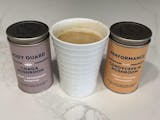Reishi Helps Reduce Symptoms of Kidney Failure
Reishi and its Activity Against Diseases
Traditional Chinese Medicine has claimed Reishi (Ganoderma lucidum) to be a tonic for the kidneys for thousands of years. Nowadays, scientific studies have established some strong evidence in the claims of Reishi’s kidney-boosting potential.
Reishi has been found to make the kidneys less permeable, enhancing the ability to filter toxins, which helps in the reduction of proteinuria and nephrosis. What does that mean?
- Nephrosis is any degenerative disease of the kidney tubules, the tiny canals that make up much of the substance and functional units of the kidneys. (1)
- Both diabetes and high blood pressure can cause damage to the kidneys, which leads to proteinuria, an abnormal amount of protein in the urine. This can affect the body's ability to regulate fluids, leading to swelling in the hands, feet, abdomen, and face. (1)
A human clinical study of 14 patients with persistent nephrotic proteinuria were subject to be treated with Reishi. Treatment with Reishi suppressed endothelial cell cytotoxicity, restored immunocirculatory balance and successfully suppressed proteinuria in all of these 14 patients. That's a 100% positive correlation! (2)
As mentioned in the section of Oxidative Stress: Lingzhi as an Antioxidant, Reishi’s large reputation for helping just about anything health-wise is partly due to its high content of antioxidants.
A study using Reishi on a test subject with kidney failure helped reverse injury and damage. The scientists noted “lingzhilactone B could protect against renal injuries by increasing the activities of antioxidants and inhibiting inflammation.” (3)
A more extensive study on Reishi and the kidneys monitored the development of renal ischemia, a deficiency of blood in the kidneys usually due to an obstruction in the blood vessels. Reishi once again helped stop kidney damage by stopping oxidative stress as an antioxidant, alleviating mitochondrial cell death. (4)
It’s important to understand that antioxidants don’t just help one system in the body—they help ALL systems. For this reason, Reishi’s antioxidative ability to slow down degeneration in the kidneys has been proven over time.
Another interesting one to mention is a study done in 2014, treating mice with diabetic nephropathy, the major cause of morbidity among diabetic patients. Again, scientists conclude that Reishi confers protection against the renal functional and morphologic injuries by increasing activities of antioxidants and inhibiting accumulation of oxidation, suggesting a potential nutritional supplement for the prevention and therapy of diabetic nephropathy. (5) For more information on Reishi and its correlation to diabetes, check out our article Reishi Helps Reduce Symptoms of Diabetes.
Kidney Disease also causes Sleep Disturbances
Unfortunately, patients with chronic kidney disease also have a higher prevalence of several sleep disturbances, including reversal of day-night sleep pattern, increased sleep latency, insomnia, and fragmented sleep related to sleep apnea or restless leg syndrome. (6) A large population study of 6,834 Japanese adults found that those who sleep less than 5 hours are 70% more likely to develop proteinuria. (7)
According to the State Pharmacopoeia of the People's Republic of China (2000), Reishi is highly recommended for insomnia and shortness of breath in sleep apnea. Reishi has loads of research that supports its use with sleep disturbances. Among its 400+ bioactive constituents, Reishi’s tranquilizing effect is due to its high amounts of GABA and TNF-alpha. TNF-alpha significantly reduces sleep latency thus improving one’s ability to fall asleep faster. Long-term use of Reishi was also shown to regulate REM and deep sleep. (8)(9) While several other studies have been performed on Reishi's ability to help sleep, both Chinese and Japanese herbalists still use Reishi today for insomnia cases to what they refer to as “sleep-promoting factor". (10)
Click on other conditions to continue exploring studies done on Reishi:
References:
1. https://www.ncbi.nlm.nih.gov/pmc/articles/PMC2394708/
2. https://www.ncbi.nlm.nih.gov/pubmed/15567896
3. https://www.ncbi.nlm.nih.gov/pubmed/24128039
4. https://www.ncbi.nlm.nih.gov/pubmed/26603550
5. https://www.ncbi.nlm.nih.gov/pubmed/24211521
6. https://www.ncbi.nlm.nih.gov/pubmed/22727724
7. https://www.ncbi.nlm.nih.gov/pubmed/22019276
8. https://www.ncbi.nlm.nih.gov/pubmed/17383716
9. https://www.ncbi.nlm.nih.gov/pubmed/22207209
10. The Sacred Mushroom “Reishi”-A Review. American-Eurasian Journal of Botany, 1 (3): 107-110, 2008. ISSN 1995-8951

